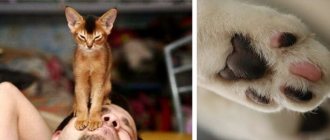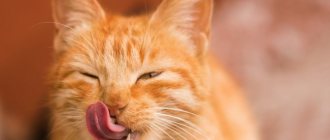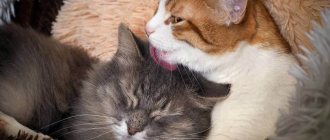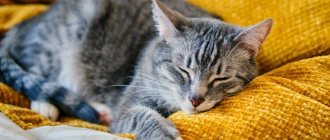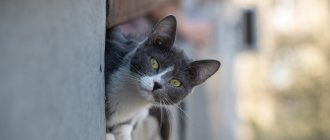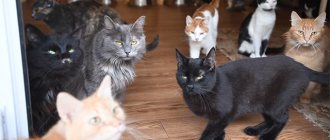- October 16, 2018
- Psychology of relationships
- Sergey Severny
The way cats perceive people often causes offense to humans. After all, in fact, with rare exceptions, cats cannot be called faithful, responsible or so necessary for a modern resident of a metropolis. Despite this, the owner spends a lot of time and effort on his favorite furball, pampering it and playing with it. As with dogs, this psychological bond is dictated by thousands of years of cohabitation, but unlike other examples of domestication, felines have taken a more dominant position, why? The article will talk about how cats perceive people. and what do they mean, supposedly signs of attention to their owner.
A process of domestication that began thousands of years ago
According to various estimates, there are about 600 million cats living on Earth today. Of these, more than 500 are completely domestic breeds that either live with people or end up on the street. All these representatives of the same family were once domesticated, right? Not really. If a person sought to domesticate a wolf or a jackal on purpose, and the type of dog itself can be called selection, then cats became attached to humans deliberately. They chose this way of life because catching, for example, mice in the territory adjacent to a settled village, was a simpler matter than full-fledged hunting. And the rodents themselves never lagged behind people, eating up their waste.
The domestication of cats occurred about 10 thousand years ago and began with the Nubian breed. The process took a long time, but over time, these “tamed” hunters began to follow the person much more often. The domestic cat today still remains close to its wild relatives. It would be a mistake to assume that it is completely tamed. It should also be noted that in an extreme situation such animals can even attack a person, especially if this is required for rescue or feeding. The way a cat perceives people is superimposed on its previous life. A person is seen as a source of more accessible food or a leader with whom the animal shares territory, temporarily, of course.
How to understand who you are to your cat - a slave, a friend or a caring parent
Cats have their own preferences. People have their own. Sometimes they match
Photo: Shutterstock
American biologists from the University of Lincoln took another step towards achieving mutual understanding between cats and people. They explained what this or that behavior of creatures living nearby is mainly based on, explained what can be expected from them, and what it is useless to demand.
“Cats and people enter into close and very complex social relationships with each other, about which little is actually known,” Daniel Mills justifies his interest in the objects of his research. - How they ultimately develop - these relationships - determines the emotional investment on the part of the owners and how sociable or independent their purring and caressing or, conversely, hissing and scratching “partners” are.
Simply put, it would be a good idea for people to imagine in advance how much cats need their “bee-bee-bee” and not be surprised by an unexpected reaction in response.
Understanding the details, scientists interviewed almost 4 thousand cat owners. Those, based, of course, on their personal experience, commented on statements that related to certain characteristics of the behavior of pets.
For example, “cat people” were asked to respond to this: “I can’t imagine what I would do without my cat.” Or to the following: “I treat my cat like a child.” Or even to this: “The cat and I have complete mutual understanding.” And further, as they say, in the same spirit - a total of 22 statements with which one had to agree - unconditionally or partially - or object. Subsequent analysis of the responses led to the conclusion: the types of relationships between people and cats are not as diverse as it might seem. There are only five of them. The study authors listed the "options" in the journal Animals.
Types of relationships
1. We depend on each other
The cat is very friendly and attached to its owner. As a rule, he has only one, and she has only one.
The cat often licks its owner, looks for him, especially when he is worried, and feels protection and support in him. He doesn’t get along well with other people and, as a rule, hides when someone stranger comes to the house.
He often caresses the cat and plays with it. The cat understands that she is treated like her own, realizes that all good things come from the owner, who feeds and makes sure that she eats. In response, the cat maintains close emotional contact - it fawns, jumps on its knees, follows its owner's heels, climbs into the bed, and loves to play. And it may seem annoying. To drive one away is to greatly offend.
2. We just know each other
The cat is one of those who like to “walk on their own.” Asks to go outside. If he lives in a country house, he can visit the neighbors without returning to the owner for several days. He behaves friendly with him, but does not strive to be close to him.
3. Let's be friends
The relationship is close to interdependent - with the only difference that the “cat friend” does not shy away from guests, welcomes them and sometimes goes away to chat with other people. The relationship with the owner is warm, but there is no desire to be constantly nearby. And the owner himself does not strive for close communication and is not emotionally attached to the cat.
Among cats there are both loving and inquisitive
Photo: Shutterstock
4. Open to communication
A cat, fully consistent with the popular idea of them as proud, freedom-loving and lonely creatures. She is equally happy with everyone - including the owner, whom she treats a little more favorably. But he also behaves independently with him, as, indeed, with other people. He can jump into the lap of anyone - both familiar and unfamiliar, or he may not jump. You can't sit like that at home. She’s not particularly keen on it.
5. Love at a distance
People feed such cats, as they say. They can be very affectionate, but prefer to keep their distance from people. Shy and unsure of themselves. They do not take root well in families and do not need owners.
BY THE WAY
Such different mustachioed stripes
A little earlier, the same scientists from the University of Lincoln, using the same tactics of interviewing owners, divided the cats according to their personalities. And we also counted five types:
1. “People-loving”: they are drawn to their older brothers in mind. They are one of those clingy dogs who enter into interdependent relationships with their owners and love to be stroked and scratched. They purr.
2. “Felines”: they are sociable, but prefer to make friends with their own kind, and even other pets. Right down to the mice. They are not afraid of dogs, they can even play with them.
3. “Hunters”: they are constantly tracking someone, they can sit by the window for hours, watching the birds. They catch mice. They love to play, often throw objects off the table, and can scratch their owner in a fit of hunting fervor. They sit hidden, suddenly jumping out of ambush. Including the owner. They are indifferent to caresses.
4. “Aggressors”: they scratch and bite, defending their right to “self-determination.” That is, they define their personal space and protect it. They avoid affection and may react angrily.
5. “Curious”: they are interested in any new subject. Or a new person entering the house. It is good to let such cats into new apartments - they will sniff all the corners, examine all the nooks and crannies.
AND AT THIS TIME
For her, there is no one more dear to you
Monique AR Udell from the Department of Animal and Rangeland Sciences, Oregon State University conducted experiments several years ago in which she found out whether cats really become attached to their owners or just pretend to be loyal friends.
Monica “tested” 50 domestic cats, which she deprived of the opportunity to do their favorite things for several hours - that is, she did not allow them to eat, play, rub themselves against their owner, or sit on his lap and sniff something.
Next, the subjects were still “given free rein” - given the opportunity to do something of their choice.
More than 50 percent of cats first of all ran to their owner - petted, purred, and held their tail up. And only then they began to be interested in food. Food, to the researcher's surprise, was in second place for cats - 37 percent preferred it.
Monica's experiments essentially refuted the myth that cats are extremely cunning, selfish and indifferent to humans. No, communication with people is the main thing for them. And they do it for fun.
The place of cats in mythology and traditions
Often cats are endowed with supernatural powers, for example, communication with the otherworldly. Even a modern intellectual, being late for a meeting, will try to get around the black cat. In Egypt, cats were considered untouchable animals and occupied a very prominent position in society, being in much better standing than, for example, a farmer or a free worker. In one role or another, these animals follow a person constantly, but not out of fidelity. Their motive is completely different, they have adapted, learned to live next to a stronger predator, while remaining virtually free. If this is not manipulation and a sign of a high mind, then who knows what is. It is unlikely that these animals could have had such a huge impact on society by accident.
Is it true that they sense our mood?
Yes it is. Cats are incredibly sensitive to negative energy. They themselves are very uncomfortable and anxious around an upset or sick owner. Sometimes they really behave like people, but they still don’t know how to consciously sympathize. No matter how much we would like to humanize our furry (or not so furry) pets, they are not capable of experiencing such complex emotions as pity and compassion.
They don't know what jealousy and resentment are. And although it seems to us that they show these feelings - for example, when another cat is born in the house - this is a struggle for a resource, instinct forces them to defend the territory and attention of their owners. Cats actually have no shame or conscience .
Although, of course, they have simple emotions (fear, curiosity, anger, joy, satisfaction, anxiety, surprise). Moreover, cats really feel sad and even become depressed if they cannot hide from something bad or stop receiving the usual pleasant stimuli.
Functions of a cat in the modern world
What is a domestic cat for? Having cast aside emotions, you should look into the abyss of your own rationalism and give an answer to such a simple question. Yes, for some animals have become an outlet, for others - an object of altruism or a way to show their care at least somewhere. But, in fact, why do you need a cat in a metropolis? She doesn't catch mice, and they hardly threaten the clerk on the 8th floor of a high-rise surrounded by other buildings. As a last resort, you can always call an exterminator who will eliminate rodents faster and more efficiently.
The expediency of people taking these animals into their homes, from a rational point of view, tends to zero. Because it only brings costs and complications. Consequently, the need to get a cat is dictated by psychological reasons. The way a cat sees a person is an example of direct integration into society at such a deep level that a refusal to connect with an animal can only appear under the pressure of need, as happens in villages. There cats are given away or drowned because they cannot feed them.
Experts obtained this data through an experiment.
79 cats (mostly kittens aged 3 to 8 months, but there were also adult cats older than a year) and their owners took part in it. Such an experiment, by the way, has already been carried out with dogs, monkeys and small children.
The scientists left the cats with their humans in a small room for two minutes, after which they asked the bipeds to leave, also for two minutes, and then return again. At this time, the behavior of the tailed animals became the object of observation.
How does a person see his cat?
A small, fluffy bundle of joy - this is how almost every cat lover will describe their animal. There is nothing strange in this, because cats are quiet, calm, and affectionate. Unlike a dog, she doesn’t need to be exercised, she does an excellent job on her own, she doesn’t even need a walk. All this stimulates a person to look into these bottomless eyes, endure bites and scratches, attributing it to the fact that the animal is playing like that and believe in the selfless love of his “lump.” Would a person forgive a dog bite? Maybe the horse’s proud temper and aggression were put on the brakes? No. The only reason why a cat appears in the house is an object of care, sensuality, the “soft” half of a person’s personality, and the animals themselves understand this very well, readily exchanging their life of hand to mouth for the torment associated with the squeezing of the next guest of their “master.”
While people specifically domesticated dogs, cats domesticated themselves
Dogs were one of the first domesticated animals. It is believed that hunter-gatherers kidnapped wolf cubs and raised them as hunting companions.
As for cats, they were mostly domesticated on their own. After people began to engage in agriculture and lead a sedentary lifestyle, they had to learn to store large reserves of grain in warehouses and primitive silos.
And if a lot of grain is stored in one place, then any farmer will tell you that eventually hordes of rats will come there. Thanks to this amount of food - rodents - cats gradually adapted to life next to people, became more open and trusting, and eventually became domesticated.
People tolerated cats because they hunted rats and thus helped store grain, and cats tolerated people because human granaries were always full of food for every taste.
Domestication is believed to have occurred in Mesopotamia and Ancient Egypt, leading to the deification of cats in these societies.
A cat's perspective
The way cats perceive people can only be summed up in one fact: they ignore people on purpose. Yes, this animal can experience emotions, pleasant or not, towards its owner, but just like in the wild, it will hide it. Why? Because this is a manifestation of weakness, which can be punished in the cruel world of predators. Thus, it is easy to note a direct correlation between the position of the animal and the external manifestation of its connections with humans. The more satisfying and autonomous a cat’s life seems, the weaker it reacts to its owner. The most common answer to the question of why cats like to sleep in public is the direct benefit of the animal, which receives more heat from the owner's body. So, if an animal receives food on time, lives in a warm house and has its own sleeping place, why should it look for additional points of contact with a person?
First meeting with a pet
In most cases, this gentle creature comes into our home as a kitten. He is scared, it seems to him that he is lost, there is no one close to him. The kitten begins to carefully explore the rooms, timidly hiding at the slightest noise, scurrying under cabinets and beds. But this particular moment is very important. In a moment of such weakness, the cat chooses its patron. She urgently needs a reliable, strong protector who will protect her from invisible dangers. How does a cat choose its beloved owner? Everything happens on an instinctive level.
© shutterstock
When meeting a small cat for the first time, the whole family is in an excited state. Mom tries to explain to her where the sun lounger, toilet, and plate of food are. The child does not miss the opportunity to cuddle the cat and show how much he loves it. The only one who remains completely calm is dad. That is why the animal often chooses men as the head of the family . They radiate self-confidence and do not fuss. This means they can protect you. Now the mother of the family will feed the cat, love, care for her, but she will express her favor to the already chosen owner.
"Big Cat"
Scientist John Bradshaw from the Institute of Anthrozoology in Bristol conducted a large-scale study, based on which he came to the conclusion that the way cats perceive people can be explained by the relationship between a younger and an older predator. Simply put, the beloved bundle of joy sees its owner as a big cat with which it shares its territory. The older predator brings food and protects the younger one, while the latter, as it seems to the animal itself, does not give anything in return, because the psychological connection is more characteristic of people.
Thus, the cat simply accepts dominance, remaining virtually free and can leave whenever it wishes. You should not think that this animal is attached to a specific person, since it has a slightly different feeling. It can be described as “the desire to prolong a profitable alliance.” That is, the cat feels “love” for certain qualities, such as: a warm home, protection, constant food, which, moreover, is tastier than hunting products.
But do they even know what their names are?
But of course! Researchers at the University of Tokyo found that cats react to their name more actively than to other sounds of the human voice: they move their ears or tails, turn their heads, sometimes even “respond” by meowing. However, there is an important nuance: this only happens if the cat’s name is pronounced by the owner. Or rather, “he-who-gives-food.”
Most likely, this sound vibration is associated for them with the expectation of pleasure. If you have several cats, you've probably noticed: as soon as you call one, they all come running. Or none. Because they don't want to. In fact, cats remember commands no worse than dogs, it’s just not beneficial for them to show their owners that they have learned something.
Manifestations of “caring”
Often cat lovers are interested in why cats crush people with their paws. Some girls who become attached to an animal even begin to perceive themselves as its “mommy,” which is completely wrong. Yes, with these movements the cat is trying to stimulate the supply of food. In fact, this is an unconscious reflex from distant childhood, when the kitten tried to knead its mother for the flow of milk. As for why a cat lies on a person and purrs, there is a similar explanation given above. Thus, the animal absorbs the warmth of the “senior predator” and remains satisfied with it. Another popular question is: “Why do cats rub against people?” In this case, there is a manifestation of affection as a member of a pride or family.
Naivety of people
Very often people perceive a cat as a very gentle and affectionate animal. This is wrong. If the owner wants a faithful friend, he needs to take a dog; it is much more distant from its wild ancestors than cats. No, this does not mean at all that you should not take cats into your home, especially homeless ones. You just need to immediately understand that these animals will not fully look into a person’s eyes with love. Yes, they are devoted to a specific house, since most often they consider it their territory. They are good to play with, and the purring of a kitten is the best antidepressant. But if such a “lump” goes to the neighbors or just for a walk, you shouldn’t tear your hair out, the cat just always remains free.
I am the center of the universe
No matter how much a kitten or cat caresses its owner, it perceives itself as the center of the Universe, and everyone else as servants. The animal does not know where the pillows with pleasant filling, sausages, sausages and other products come from; in addition, they may have their own gastronomic preferences. Cats usually love those who feed them, but they can also show favor to the family member who plays with them, pampers them, and even sleeps with them. It has been proven that cats have a great sense of energy and cannot stand those who are used to screaming, fighting and swearing, trying to hide from them as far as possible. If a cat feels affection for one family member, it means that he perceives him as a kind person, if he doesn’t love someone, he perceives him as evil and does not hide his true feelings behind a mask of politeness. There are known cases when cats, affectionate towards all family members, hissed and rushed at those who might be hostile to the owner of the house.
READ ALSO: How to sell a wristwatch?
Interesting Facts
Few people know, but cats “communicate” by meowing only with humans. Thus, it is easy to note that felines' intelligence is more advanced than most people imagine. In addition, these animals know how to manipulate people. It’s worth taking a closer look at your fluffy little one, who has once again come up to rub against his legs; perhaps he has run out of food in his bowl, and the cat itself knows that a treat will follow the show of affection on its part. Too much care causes psychological torment to the animal. This especially affects how cats perceive children. You shouldn’t constantly cuddle the animal; it is still wilder than its other domesticated “brethren.”
Coupled with the fact that the cat was domesticated independently, this makes this category of pets simply “cohabitants” with humans. Don’t deceive yourself into thinking that this particular cat is loyal and understanding. However, all of the above does not negate the fact that fluffies are extremely affectionate and playful. It is quite possible that this is what makes them so beautiful in human eyes.
So what, they don't like us at all?
How to say. They “trample” us with their paws not because they want to give us a massage, but because they still have a reflex called the “milk step.” Kittens absorb it from birth, stimulating milk production in the mother. They climb on our laps or on our bellies because we are warm and soft.
When a cat rubs against our legs, or “butts” its head, inviting us to scratch behind the ear, this is the highest sign of affection. Hurray, we deserve it! But know: the cat “marked” you, that is, left an elusive smell on your things, which for her means: “this is a friendly creature, I trust him.” By the way, they behave exactly the same way with each other.
Don't expect the same unconditional love and devotion from cats as you do from dogs. There are exceptions, of course, but they are extremely rare. For them, we are not the center of the Universe . They can think about anything: about the birds outside the window, about a new box, about a thin cobweb under the ceiling, and not pay attention to fussy people.
The next time you call your beloved cat son, or start scolding him for pranks, remember that for them we are just equal relatives who, for unknown reasons, move on two legs.
But don't be upset - they are really happy when we come home and generally love us. Only in his own way, continuing to live his special cat life.
